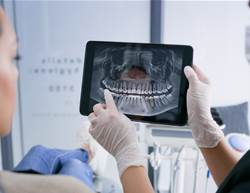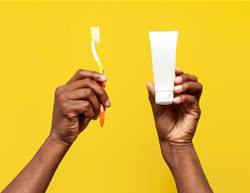Beauty is as much about confidence as what colour lippy you choose, so if you’re chatting with friends at a dinner party and you get that not-so-fresh-breath feeling, your perfect poise can easily be thrown out of whack. You may have mints on hand, but if it happens on a regular basis it’s a good idea to look at the underlying cause.
Most bad breath is due to an overgrowth of anaerobic bacteria (the strains that don’t need oxygen to survive) in saliva that produce foul-smelling, sulphurous compounds. The bacteria – which coat the mouth, teeth and tongue – release the potent mix as they feed on food residue.
Postnasal drip or infections such as sinusitis can also make your breath reek from bacteria, as can dry mouth, which leaves less saliva to wash away the food particles bacteria feed on and less moisture to mask odour.
If you suspect your breath is a little less than fresh, lick the back of your hand, then smell it: if it has an odour, you know your breath does, too. Or checking the smell of your dental floss after cleaning your teeth is another test.
The following steps can help you keep your breath as fresh as your confidence.
Preventing bad breath
Brushing and flossing
Brush at least twice a day, and floss once daily. Don’t be skimpy with floss: “Use a long strand and unwind it from one finger to another as you move from tooth to tooth to avoid taking bacteria out of one space and depositing it in another,” says periodontist Nico Geurs.
Tongue cleaning
Use a toothbrush or tongue cleaner to scrape your tongue every time you brush, especially at the back, where bacteria are most likely to accumulate due to the rougher surface and lack of cleansing friction from contact with other mouth parts. One study found that tongue cleaning reduces sulphur compounds by more than a third.
Avoiding certain foods
In addition to avoiding onions and garlic, steer clear of sugar to prevent bad breath. “Snacking on sweets provides waves of sugar that cause spikes in bacterial growth,” says periodontist Salvador Nares.
Home remedies
Water
Saliva contains bacteria, but it also helps wash bacteria from the mouth. A dry mouth lets offensive microbes stick around, giving them more opportunity to release malodorous compounds. Sip water throughout the day to maintain saliva flow; this is especially important for older adults, as mouths tend to get drier with age.
New toothbrush
Bristles become less effective at sweeping away food residue over time, so replace your toothbrush every 2 to 3 months. Never share your toothbrush or use someone else’s. This can introduce bacteria into your mouth, leading to bad breath, as well as gum disease and other dental problems.
Rinses
Unlike many mouthwashes, dry mouth rinses help fight bad breath by moistening the mouth via ingredients like hydroxyethyl cellulose and glycerin. Some also contain agents such as chlorine dioxide and zinc salts to reduce odour.
Medical treatments
Prescription management
Dry mouth is a side effect of a variety of OTC and prescription drugs, including some antihistamines, antidepressants, muscle relaxants and blood pressure meds. Ask your doctor if you can safely eliminate any of your prescriptions, reduce the dosage, or switch to a similar drug.
Routine cleaning
No matter how faithful you are with brushing and flossing, bacteria can still build up and form tartar, the hardened deposits that can be removed only with a professional clean. See your dentist – who will also check for gum disease, a potentially more serious source of foul breath – at least once a year.
Periodontal treatment
When gums recede (due to underlying bone loss, aggressive brushing, or an infection below the gumline) pockets form where bacteria accumulates. Deep cleaning by a dentist can help. If gum disease is advanced, your dentist may recommend a periodontist for specialised treatment.








